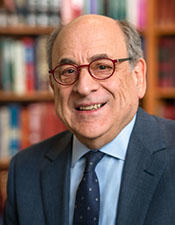2022 Canada Gairdner Award given to Stuart H. Orkin, MD, researcher at Dana-Farber/Boston Children’s Cancer and Blood Disorders Center
- Published:

Award honors transformative contributions to research impacting human health
The Gairdner Foundation has announced that Stuart H. Orkin, MD, is one of the 2022 Canada Gairdner Award laureates for seminal discoveries and contributions to biomedical science.
Orkin, the David G. Nathan Distinguished Professor of Pediatrics at Dana-Farber/Boston Children’s Cancer and Blood Disorders Center and Harvard Medical School, and a Howard Hughes Medical Institute Investigator, was recognized for the discovery of the molecular mechanism responsible for the switch from fetal to adult hemoglobin gene expression during human development and translating that knowledge into a novel treatment for the hemoglobin disorders -- sickle cell disease and beta-thalassemia.
The Gairdner Foundation was established in 1957 by Toronto stockbroker, James Gairdner to award annual prizes to scientists whose discoveries have had major impact on scientific progress and on human health. Since 1959 when the first awards were granted, 402 scientists have received a Canada Gairdner Award and 96 to date have gone on to receive the Nobel Prize. The Canada Gairdner Awards promote a stronger culture of research and innovation across the country through outreach programs including lectures and research symposia.
Orkin’s pioneering work in genetic disorders of hemoglobin spans four decades and has unraveled molecular mysteries behind how blood cells develop and how disorders of blood arise. His most recent studies led to the discovery of the molecular mechanism responsible for the switch from fetal (HbF) to adult (HbA) hemoglobin gene expression that occurs during human development. Capitalizing on genetic clues from human population studies, Orkin and colleagues established that the protein BCL11A acts as the critical silencer of HbF expression in adults. Recognizing that turning HbF expression back on could lessen disease severity of sickle cell disease and beta-thalassemia -- genetic disorders affecting HbA production – he proposed downregulation of BCL11A as a therapeutic approach. Dialing down the amount of BCL11A would reactivate HbF expression and effectively substitute for mutant or deficient HbA in these disorders. His group first demonstrated that downregulation of BCL11A expression corrects sickle cell disease in engineered mice, an important proof-of-principle for therapeutic translation. He and his colleagues identified a discrete site in a regulatory element within the BCL11A gene itself that, if deleted by CRISPR gene editing in blood stem cells, would impair BCL11A expression only within developing red blood cells, and safely reactivate HbF expression. This work laid the groundwork for highly promising, ongoing clinical trials in patients with sickle cell disease and beta-thalassemia, diseases that affect >5 million individuals worldwide. Reactivation of HbF in patients in these genetic therapy trials has yielded transformative results: freedom from sickle crises and anemia in sickle cell disease and transfusion-independence in beta-thalassemia.
His work has had a tremendous impact and much of what is known about the control of gene expression during blood cell development can be traced directly to Orkin’s pioneering studies. His discoveries have paved the way for clinical approaches that will revolutionize the treatment of hemoglobin disorders – sickle cell disease and beta-thalassemia – that affect more than five million people worldwide. Clinical trials that are currently underway establish the therapeutic potential of HbF reactivation. The outcomes of these trials will have significant impact for patients suffering from hemoglobin disorders around the globe, and will encourage the future development of cheaper and more readily accessible therapies for global application.
More information about the other award winners is available at www.gairdner.org

 Translate
Translate